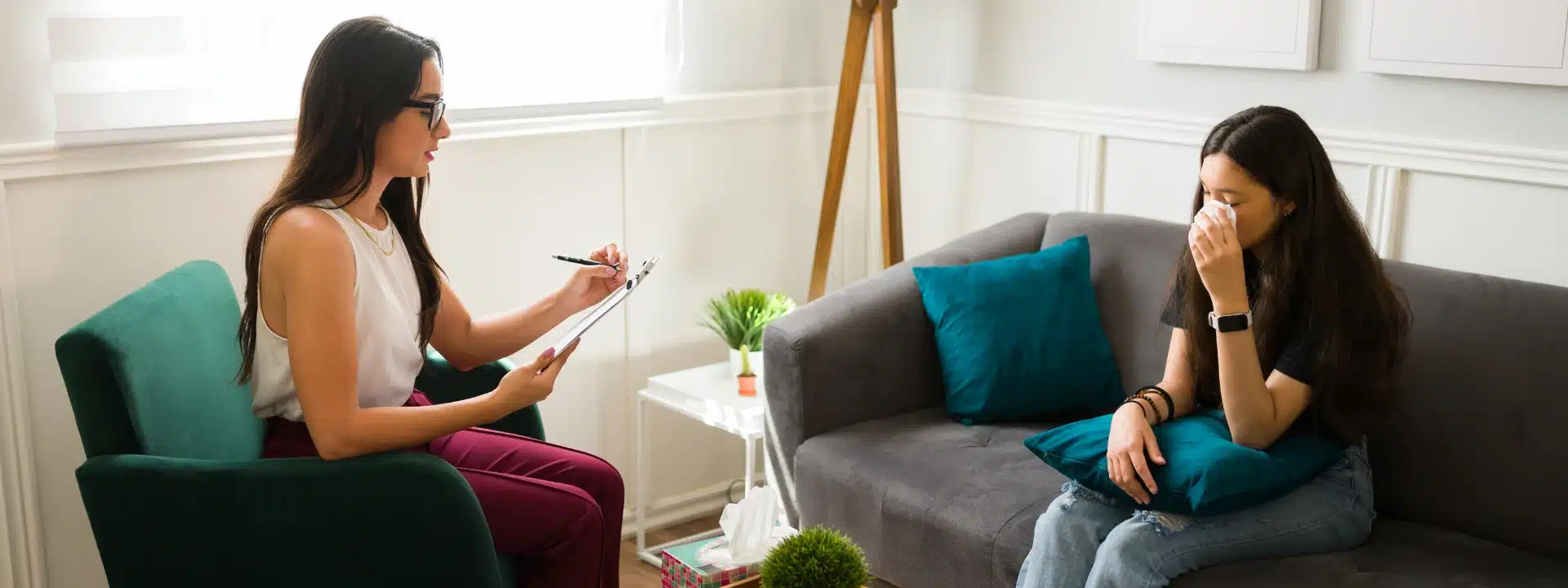Connecting with people can sometimes feel like a challenge. Have you ever felt like sharing with people is difficult? Or do you think you just don’t belong, no matter what room you are in?
Worst of all, do you pull away just when things get too close?
Chances are, you need attachment-based therapy.
Attachment-based therapy focuses on rebuilding our fractured sense of belonging. The way we form bonds begins in childhood. And if your childhood lacked stability, you may grow up feeling disconnected from others. Attachment patterns shape how we connect, and if you’re struggling with closeness, attachment-based therapy can help you break down the walls you’ve built.
Attachment-based therapy gives individuals, couples, and families a chance to revisit old wounds with a clear path to healing. It allows you to understand why you struggle to build close, lasting bonds and helps you rewrite the story you tell yourself about attachment.
What Is Attachment-Based Therapy?
Attachment-based therapy is a groundbreaking therapeutic approach. John Bowlby studied the bonds that children build and how those bonds shape their future. You may have heard that adults are just grown-up kids—and there’s truth to that.
How children feel about their caregivers growing up becomes the blueprint for how they see closeness and even love.
Attachment-based therapy is designed to heal these issues. Children who don’t feel secure can become adults who struggle with communication. But with therapy, you can break these cycles and go on to have meaningful relationships and even happy families.
Secure attachment can heal patterns that pass through generations.
How Does Attachment-Based Therapy Work in Practice?
Here’s how attachment-based therapy works: At first, you might struggle to open up, but soon you realize you no longer need to hide behind a mask. You begin to feel safe, trusted, and able to speak about things that once triggered you.
At Alter Behavioral Health, our trained therapists encourage you to talk, not with a rigid script but through guided conversations. Our goal is to increase open communication in your relationships. We look at past relationships and prepare you for healthier ones in the future.
We explore your early experiences to understand your inner child — because empowering the child empowers the adult.
Therapy sessions may involve a lot of listening and responding. In family counseling, this can be tricky, but the goal is always to build secure bonds and strengthen trust. That means facing old wounds instead of hiding from them.
How Attachment-Based Therapy Helps Different Groups
Attachment is something we experience in all relationships, from childhood pets to after-school friends to our spouses.
Here’s how therapy helps different groups:
Children
A child is constantly evolving. They learn from their parents, their siblings, and their environment. When a child experiences consistent attention, safety, and love, it shapes how they form relationships as adults.
Adults
Adults may seem functional in their communities but often carry unresolved pain. Attachment issues in adults can lead to unresolved conflicts and shallow friendships. Therapy allows you to identify these issues and guides you toward building healthier attachment styles.
Couples
Couples fight—that’s normal. But constant conflict is often a reflection of deep attachment wounds. Adults may avoid or struggle with closeness if they don’t address these childhood wounds. You may have heard someone say, “He’s just avoidant.” Therapy unravels that behavior and helps couples rewrite the stories that hold them back.
Trauma Survivors
Trauma rewires the brain and can change how you see love and connection. It often manifests as self-doubt, guilt, or paralyzing anxiety. Attachment-based therapy helps you rebuild trust in yourself and in close relationships. It allows survivors to find safety and adapt to life again.
Is Attachment-Based Therapy Right for You?
Here’s how you can tell if attachment-based therapy may be right for you:
Relationship Struggles
If you keep experiencing arguments, trust issues, and emotional walls in your relationships, you may benefit from therapy. Chances are, you are repeating negative patterns and need support to break them.
Trust Issues
It’s normal to be cautious as an adult, but constant suspicion or paranoia is not. If you find yourself always looking over your shoulder, therapy can help you resolve underlying attachment issues.
Unresolved Trauma
Trauma may not always be visible, but it affects relationships, focus, and your ability to enjoy life. If you’ve been avoiding painful past experiences or unresolved childhood trauma, therapy can help you face and heal them.
Finding the Right Therapist
Looking for a therapist can feel like dating, and that’s why many people avoid it. And it can feel overwhelming and discouraging.
This isn’t the case at Alter Behavioral Health. Our therapists are experts in attachment theory and well-versed in relationship-based approaches. We make you feel safe, supported, and comfortable.
Through compassionate, guided therapy, we help you understand yourself before working together to overcome your challenges.
Your mental health is our top priority.
Ready to begin? Reach out today to connect with a qualified therapist.
Frequently Asked Questions
1. What is attachment-based therapy?
It’s a form of counseling that focuses on healing insecure or disrupted attachment patterns to build healthier relationships.
2. Who can benefit from attachment-based therapy?
Children, teens, adults, couples, and even families who are struggling with trust, intimacy, or unresolved trauma.
3. How is it different from other therapies?
It specifically targets how early attachment experiences shape current behaviors, emotions, and relationships.
4. What happens in a typical session?
Sessions often include open dialogue, exploring childhood experiences, role-play, and exercises to strengthen secure bonds.
5. Can attachment-based therapy help with anxiety and depression?
Yes. By addressing root attachment wounds, many people experience relief from anxiety, depression, and loneliness.
6. Is attachment-based therapy helpful for couples?
Absolutely. It helps couples rebuild trust, resolve conflict, and deepen emotional intimacy.
7. How long does therapy usually take?
It varies, but many clients begin noticing positive changes within a few months of consistent sessions.
8. What techniques do therapists use?
They use trust-building, reflective listening, guided conversations, and sometimes role-playing to create new patterns of connection.
9. Can this therapy help if I’ve experienced trauma?
Yes. It’s often used to help trauma survivors rebuild safety, self-worth, and secure emotional bonds.
10. How do I find a qualified attachment-based therapist?
Look for licensed therapists trained in attachment theory or visit Alter Behavioral Health for a counseling session.



